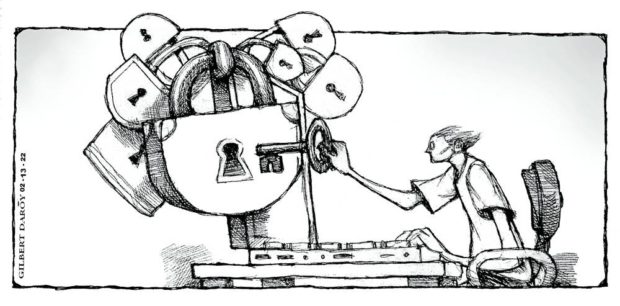Improving data privacy awareness

A survey commissioned by the National Privacy Commission (NPC) late last year has shown that more Filipinos are aware of data privacy and privacy issues, but still have to know more about internet security to be able to protect themselves from cybercriminals.
According to the nationwide poll conducted by the Philippine Survey and Research Center (PSRC) among 1,000 respondents from October to November last year, public awareness and knowledge of Republic Act No. 10173, or the Data Privacy Act, increased to 25 percent in 2021, from 13 percent in 2017.
But only nine percent of respondents said they are familiar with internet security and proper social media usage that would prevent them from falling prey to cybercrimes. The survey likewise revealed that data privacy awareness is concentrated in the National Capital Region and other urban areas where internet access is high.
When asked where people can raise data privacy complaints, only five percent of the respondents considered the NPC. The survey showed that 43 percent would report to the police; 32 percent simply did not know where to turn to, and 19 percent pointed to the National Bureau of Investigation.
“Only one in 20 individuals believe they can file complaints to the NPC,” the PSRC said of its survey results. The low level of awareness about NPC also runs across all locations and socioeconomic classes. For instance, 95 percent of the poor, or those under socioeconomic class E, said the survey was the first time they’ve heard or read about the NPC. Only five percent of respondents in the Visayas said they have previously heard or read about the Commission. The numbers elsewhere were also low: 14 percent in Metro Manila, 11 percent in the rest of Luzon, and 12 percent in Mindanao.
This dire lack of awareness is disheartening since it’s been nearly six years since the privacy watchdog was formed. The Data Privacy Act was actually passed in 2012, but the NPC was set up only in March 2016. Aside from its mandate to administer and implement the Data Privacy Act, the NPC is tasked to monitor and ensure the country’s compliance with international standards for data protection. The agency is also mandated to receive and resolve complaints from citizens and businesses, initiate inquiries, and call for investigations on matters affecting privacy.
Such discouraging figures on the Filipinos’ awareness of the NPC and of privacy issues, specifically how they can protect sensitive personal information, find confirmation in the surging number of consumers victimized by cybercriminals.
Results of a research by multinational credit reporting firm TransUnion released last week showed that half of adults in the Philippines have been targeted by digital fraudsters, while one in every five of them has fallen prey to online scammers. The younger Generation Z has been found to be the most susceptible. Prior to the COVID-19 pandemic, only six to seven out of every 100 Filipinos reported being victimized by digital fraudsters, who have become more aggressive and sophisticated in the last two years of lockdowns, TransUnion president and CEO Pia Arellano told this paper in an interview.
TransUnion’s Philippines Consumer Pulse Study sought to gauge the financial impact of COVID-19 on consumers among 1,089 adults from Nov. 1 to Nov. 8, 2021. The research showed that digital fraud continued to be a significant worry, especially around Christmas, with 95 percent of consumers saying they were concerned about being victimized during the holiday season. Across generations, Gen Y or millennials (born between 1980 and1994) and Gen X (born 1965-1979) were the most targeted at 54 percent and 52 percent, respectively. About 10 percent of the respondents had been targeted by a fraud scheme and became a victim of it, up by 4 percentage points from the previous quarter’s survey.
The survey commissioned by NPC suggests that the privacy agency still has a long way to go before it becomes top of mind on data privacy issues.
“The [NPC] recognizes the importance of continuously promoting data privacy awareness, most especially in locations such as rural areas and those in the lower economic classes,” admitted Privacy Commissioner John Henry Naga. “Therefore, we are planning to focus our efforts in increasing data privacy and protection awareness, which in effect will educate and empower data subjects, making them less vulnerable to data privacy abuses,” he added.
Heightened awareness and familiarity with data privacy concepts are truly essential, not only in improving public satisfaction and engagement with the NPC, but more so in helping protect ordinary Filipinos from online scams and cybercrimes that proliferate in the internet. Education through an aggressive information drive by the NPC remains the best defense against these scammers and digital-age swindlers.
RELATED OPINION




















